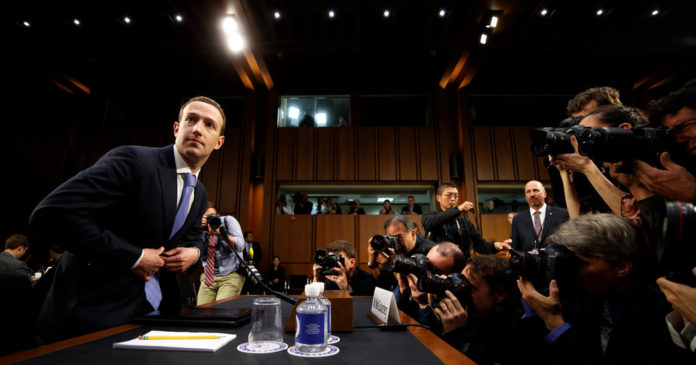(Want to get this briefing by email? Here’s the sign-up.)
Good morning,
We start with Facebook’s latest data scandal, a Senate vote to overhaul the country’s criminal justice system, and the delayed sentencing of Michael Flynn.
Facebook shared user data with tech giants
A Times investigation has found that the social network gave major technology firms, among other companies, far more access to users’ personal data than it had disclosed, effectively exempting those businesses from its privacy rules.
The social network let Amazon obtain users’ names and contact information through their friends, and allowed Spotify and Netflix to read, write and delete users’ private messages. Facebook shared data with more than 150 companies, including The Times.
A 2011 agreement with the Federal Trade Commission banned the social network from sharing user data without explicit permission. Here are the five main takeaways from our investigation.
How we know: The Times interviewed more than 60 people, including former employees of Facebook and its partners, former government officials and privacy advocates. It also reviewed more than 270 pages of internal Facebook documents and performed technical tests and analysis to monitor the information being passed between Facebook and its partners.
Response: Steve Satterfield, Facebook’s director of privacy and public policy, said none of the partnerships violated users’ privacy or the F.T.C. agreement. “We know we’ve got work to do to regain people’s trust,” he said.
Senate passes a sweeping criminal justice bill
Lawmakers on Tuesday overwhelmingly approved the most substantial changes in a generation to laws that have ballooned the federal prison population and created a criminal justice system that many conservatives and liberals alike view as costly and unfair.
The details: The First Step Act would expand job training and other programs aimed at reducing recidivism among federal prisoners. It would also expand early-release programs and modify sentencing laws, including mandatory minimum sentences for nonviolent drug offenders.
What’s next: House leaders have pledged to pass the measure this week, and President Trump has said he would sign the bill.
Michael Flynn’s sentencing is postponed
Expressing “disgust” at efforts by President Trump’s first national security adviser to mislead investigators, a judge in Washington on Tuesday delayed Mr. Flynn’s sentencing until at least March to give him time to prove the value of his cooperation with federal prosectors.
The judge, Emmet Sullivan, has a reputation for being hard on government misconduct, but he dismissed suggestions that Mr. Flynn had been treated unfairly by federal agents. Judge Sullivan also left no doubt that he viewed Mr. Flynn’s crimes as serious enough to warrant prison time, even though prosecutors recommended that he receive a lenient sentence.
The background: Mr. Flynn pleaded guilty a year ago to lying about his conversations with the Russian ambassador in the month after Mr. Trump’s election in 2016.
Hacked European Union cables reveal global anxieties
Hackers infiltrated the bloc’s diplomatic communications for years, stealing cables that reflected unease over the unpredictability of the Trump administration, Russian aggression, China’s rise and Iran’s nuclear program.
Computer networks of the U.N., the A.F.L.-C.I.O., and ministries of foreign affairs and finance worldwide were also infiltrated.
How we know: Area 1, the firm that discovered the breach, made more than 1,100 of the hacked cables available to The Times.
If you have 10 minutes, this is worth it
Testing evolution where the idea began
On the Galápagos Islands, Charles Darwin once saw a blueprint for the origin of every species, including humans.
The islands now face their greatest evolutionary test yet, and scientists are worried. Our journalists traveled 600 miles off the coast of Ecuador to see how ocean warming is affecting Darwin’s first laboratory.
Here’s what else is happening
Uncertainty on shutdown: Republican leaders say they’re not sure what legislation President Trump would be willing to sign to avert a partial government shutdown this week. The White House signaled on Tuesday that the president was backing down from his demands for funding for a border wall.
Trump charity to close: The Donald J. Trump Foundation will give away its remaining assets and shut down after the New York attorney general accused it of engaging in “a shocking pattern of illegality.”
Bump stock ban: The Trump administration has banned the attachments, which enable semiautomatic rifles to fire in sustained, rapid bursts, and which were used in the mass shooting in Las Vegas last year. Owners have 90 days to destroy the devices or turn them over.
Shift on migrant children: Thousands of children who have been in shelters for months could soon be reunited with family members, as the administration announced plans to ease security requirements for sponsors.
Interest rate decision: The Federal Reserve is widely expected to announce a quarter-point increase in its benchmark interest rate today.
Preparing for Brexit: With Britain’s departure from the European Union scheduled for March 29 and the terms of that exit still undefined, the government is making plans to deal with possible chaos, including placing 3,500 troops on standby.
Breast implant concerns: Implants made by Allergan that have been linked to an uncommon form of cancer are being taken off the market in Europe. The products, which have a textured surface, are more common in Europe than in the U.S., where smooth ones are more often recommended.
Snapshot: Above, a long-exposure photograph of the London installation “The Light Station” on Tuesday, when the sun set at 3:51 p.m. The winter solstice is Friday, the day the Northern Hemisphere will get the least sunlight of the year.
In memoriam: Penny Marshall starred in the 1970s sitcom “Laverne & Shirley” and went on to become the self-deprecating director of hit films like “Big” and “A League of Their Own.” She was 75. Read an appreciation by our chief TV critic.
Alice Walker controversy: In an interview with The Times, the author of “The Color Purple” praised a writer accused of anti-Semitism. Our Book Review editor explained why we featured Ms. Walker.
Late-night comedy: Stephen Colbert was happy to review some of the most squirm-inducing moments from Michael Flynn’s court appearance.
What we’re reading: This piece from Wired, recommended by Kevin McKenna, a deputy business editor. “Elon Musk’s audacious ambitions are often overshadowed by outrageous behavior,” he writes. “This piece by our former colleague Charles Duhigg tells what it’s like at Tesla to work for ‘Dr. Elon & Mr. Musk.’ In short: not pretty.”
Now, a break from the news
Smarter Living: Writing a family newsletter? If you’re sending it to a wide range of friends and family, keep the updates general and breezy. If it will go only to a select few, you can go into more detail. Go ahead and brag — within reason.
Also, have you ever wondered why you start things you’re certain to never finish?
And now for the Back Story on …
How the Chinese say “trade”
China and the U.S. may have declared a truce in their trade war, but it’s far from over.
This gives us the opportunity for a language lesson.
The English word “trade” is Germanic, originally meaning “track” or “path.” Its modern usage evolved from a Dutch word referring to “means of living,” as in the carpentry trade. Over time, the trade of buying and selling goods came to be called simply “trade.”
In Mandarin Chinese, the word for trade is “màoyì” (“trade war” is “màoyì zhàn,” pronounced MAU-ee-jahn).
The character mào (贸) means “to trade,” while yì (易) means “to exchange.”
Yì also has the meaning “easy,” and the character appears in the Chinese word for “easy,” which is “róngyì” (容易).
Of course, trade between China and the U.S. is anything but easy these days.
That’s it for this briefing.
Do you have a story idea, a question for our newsroom or feedback on our coverage? Please let us know.
See you next time.
— Chris
Thank you
To Eleanor Stanford for keeping an eye on culture, and Kenneth R. Rosen for Smarter Living ideas. Jennifer Jett, an editor in Hong Kong, wrote today’s Back Story. You can reach the team at briefing@nytimes.com.
P.S.
• We’re listening to “The Daily.” Today’s episode is about the ethics of genetically editing babies.
• The single most downloaded episode of “The Daily” this year was “The Blasey-Kavanaugh Hearing,” with 1.93 million downloads.
• Here’s today’s mini crossword puzzle, and a clue: Group that requires intelligence testing to join (5 letters). You can find all our puzzles here.
Source : Nytimes












